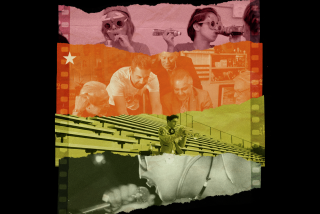Eyes on the ‘Chicano!’ Prize : ‘History of the Mexican-American Civil Rights Movement’ on PBS is a refreshing and eye-opening course on a struggle hard fought and too little known.
- Share via
Viewers are accustomed to television assigning Latinos mostly to a barrio of cheap, squalid, dehumanizing stereotypes, when they appear at all on the small screen.
Crop Cinco de Mayo from the picture, and they show up primarily as scary, gang-banging criminals. As an underclass of faceless maids, busboys and gardeners who don’t, or won’t, speak English. As illegal usurpers from south of the border, at once victimizer and victim, sneaking into the United States, then scattering like bugs when discovered by authorities.
So get ready for one of those rare times when brown brawn and intellect are flexed on TV.
The occasion is “Chicano! History of the Mexican-American Civil Rights Movement,” a passionate, opinionated, rewarding documentary that travels across a decade of civil unrest en route to the Holy Grail of citizen empowerment. The setting is 1965-75, the story not about seeking cultural assimilation with America’s dominant Anglo society, but primarily a minority’s battle for political power and fairness and equal opportunity under the law.
Some may oppose the “Mexican-American” in this PBS program’s title. They may argue that its ethnic hyphen implies falsely that Mexicans are immigrants in America as much as Europeans or Asians, or are no more indigenous than Americans of African descent, when in fact it was this land’s conquerors who made Mexicans outsiders, in effect, by creating borders to suit themselves. That debate is better left to pundits.
In any case, viva “Chicano!,” a two-parter where the spirits of Aztecs, Juarez and Zapata mingle with social and political activists in Crystal City, Texas, in East Los Angeles, in New Mexico and in California’s fertile growing fields where the miseries of migrant farm workers give root to an amazing labor movement created by Cesar Chavez.
Well, not a labor movement in its soul, perhaps. “Cesar . . . made this clear that it was a civil rights movement,” Cal State Northridge Professor Rudolfo Acuna says during the four-hour program regarding the formation of the United Farm Workers.
“Chicano!” executive producer Jose Luis Ruiz and individual producers of the four segments pair such talking heads with archival pictures and other material threaded by the narration of Henry Cisneros, a former four-term mayor of San Antonio, who is now the nation’s Secretary of Housing and Urban Development. Of particular note are the program’s many interviews with Chicana activists, almost in counterpoint to the frequent omission of women in male-written histories of the United States.
Arguably as large is the void in the public’s knowledge of the Chicano movement detailed by this program, which was inspired by those earlier “Eyes on the Prize” and “Eyes on the Prize II” documentaries about the black civil rights movement. You may feel the effects of that vacuum immediately. Whereas African American reference points in the “Eyes on the Prize” programs were almost instantly recognizable, many in the “Chicano!” audience will find themselves bombarded by a spate of unfamiliar names and events that tend to blur in the program’s initial hour (produced by Mylene Moreno and Hector Galan). Stripping back layers of obscurity, it opens in 1966 with a movement by activists to reclaim New Mexico lands incorporated by the United States after the Mexican-American War in 1848.
Gradually you settle in, and the second hour (produced by Sylvia Morales) is especially strong in recounting the campaign of the relentless Chavez--whose name is widely known--to organize grape boycotts and unionize Latino farm workers. His heroic efforts not only liberate them from the shadows but also help energize an entire generation of Mexican Americans.
The following week’s second installment opens with a fascinating hour (produced by Susan Racho) set mainly in East Los Angeles, where underemployed, underpaid, under-skilled and undereducated Latinos live in the nation’s largest barrio. It’s here, in 1968, where 15,000 students protest in the streets against their inferior schooling and biased counseling, where these student “blowouts” draw the wrath of police and result in the criminal indictments of 13 activists, and where the reinstatement of a charismatic teacher-leader becomes a moment of high drama.
Chicano moves on the ballot box should be just as dramatic, but they’re not. Although starting well, the final hour (produced by Robert Cozens), about the rise in Texas of La Raza Unida as a third party that nominates a Chicano for president in 1972, bogs what’s left of the program in a thick swamp of detailed, insider convention politics.
Although dissident voices are granted a small corner of its stage, the documentary never moderates its strong points of view concerning the ethnic hatred at least partially responsible for stunting Mexican Americans’ progress, some of which lingers in 1996 among those for whom “Mexican” remains as much a dirty word today as it was in the decade of civil rights strife so vividly recalled in “Chicano!”
* “Chicano! History of the Mexican-American Civil Rights Movement” airs tonight and next Friday at 9 p.m. on KCET-TV Channel 28.
More to Read
The complete guide to home viewing
Get Screen Gab for everything about the TV shows and streaming movies everyone’s talking about.
You may occasionally receive promotional content from the Los Angeles Times.






